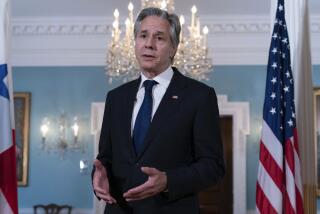Bush Cautious on Further Aid to Poland
- Share via
WASHINGTON — President Bush declared Wednesday that the West “must do more” to help Poland make the transition to a free-market economy but indicated that the United States would continue to move slowly on further aid until Warsaw worked out a program of economic reforms.
“We want to work with them in every way we can, but I think it’s important to see what their plan is,” the President told reporters after a speech to the 152-country International Monetary Fund.
Bush also urged the world’s major commercial banks to step up their lending to debt-ridden countries under his Administration’s new Third World debt plan, saying that it would be in the banks’ own “self-interest”--as well as that of the debtors--for them to keep up their lending.
And he hinted that Washington eventually would support a request for a doubling of the IMF’s lending resources, which now stand at $120 billion, though not necessarily by the end of this year as some foreign governments had hoped.
The United States has blocked any action on the proposed increase during this year’s IMF meeting, which has been under way since Monday, saying that the Treasury is not yet convinced that a boost in lending resources was needed.
The developments came as finance ministers of the major Western governments and Poland’s new economic policy-making team continued separate discussions on a series of possible aid measures to help Poland modernize its economy. The talks are still in a preliminary stage.
Polish Finance Minister Leszek Balcerowicz outlined a request Wednesday for about $490 million to $500 million in immediate aid to help Poland maintain the cash flow it needs to continue buying imports during the early stages of its move to a free market economy.
He also served notice that Poland would need an even larger, unspecified package of new loans to help finance a restructuring of its currency to a single, unified exchange rate, much as the United States has--a shift that is fraught with technical and economic difficulties.
New Economic Program
Balcerowicz said Wednesday that Warsaw’s new economic program probably would contain at least three major elements--tight money and credit policies and price-stabilization moves, a cutback in the government’s role in the economy and reduction of Poland’s foreign debt.
But the minister was sketchy on details of this and other economic moves that the new government might have to adopt. “The general atmosphere was very warm, but no specifics,” he said of his talks with Western officials. The Westerners, in turn, echoed similar sentiments.
Both U.S. officials and those of other major industrial democracies said that the talks probably would continue for several more weeks.
Bush on Wednesday urged the IMF and its sister organization, the World Bank, to “work rapidly” with Polish authorities to hammer out an acceptable plan. But the President’s own tone--and that of other Western officials here--clearly was one of moving cautiously.
The Administration currently is supporting a $119-million, three-year package of U.S. economic aid to Poland and has proposed doubling American food aid to Poland from its present $50 million.
On Tuesday, the European Community and 12 other nations, including the United States and Japan, unveiled a separate package of $650 million in economic aid for Poland and Hungary combined.
The President’s exhortations to step up bank lending to the Third World was part of an effort to jump-start the Administration’s new debt-reduction plan, which has been stalling in the face of resistance by the banks.
The Administration’s Third World debt plan, known as the Brady Plan, after Treasury Secretary Nicholas F. Brady, its author, differs from its predecessors in that, for the first time, it provides for actual reduction of Third World debt rather than just new loans.
More to Read
Get the L.A. Times Politics newsletter
Deeply reported insights into legislation, politics and policy from Sacramento, Washington and beyond. In your inbox twice per week.
You may occasionally receive promotional content from the Los Angeles Times.









